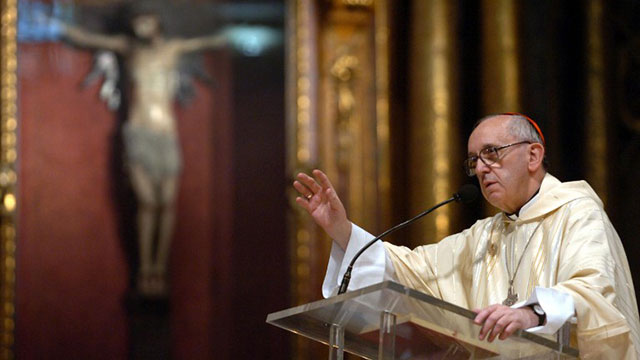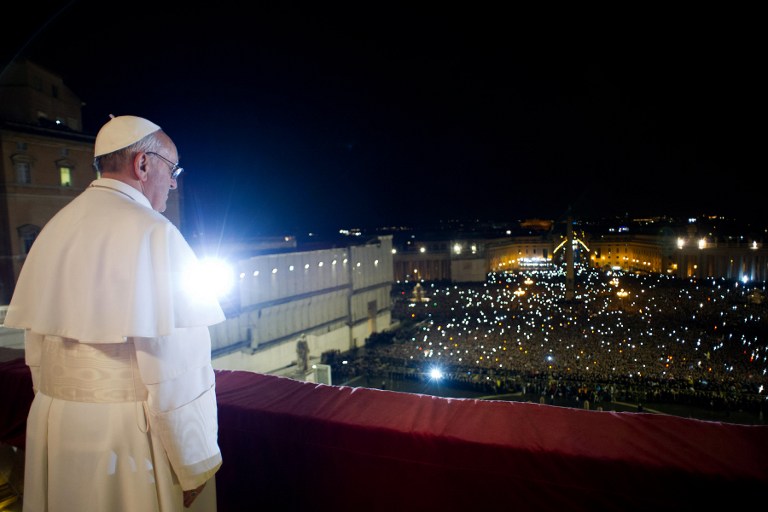SUMMARY
This is AI generated summarization, which may have errors. For context, always refer to the full article.

MANILA, Philippines – A Jesuit pope. The election of Pope Francis marks the first time a member of the Society of Jesus took the reins of the Catholic Church. What does it mean and why is it a novelty?
News that Jorge Bergoglio is the new Bishop of Rome shocked not just Argentinians but also his fellow Jesuits all over the world.
“We always had this consciousness that a Jesuit could never be a pope. This is the first time. It’s a big surprise that the cardinals elected someone who is a Jesuit,” said Fr Jose Quilongquilong SJ, rector of the Loyola House of Studies.
The Society of Jesus, known as the Jesuits, is the largest religious order of men in the Catholic Church, with about 20,000 members worldwide. Called “a powerful and controversial order,” the Jesuits are known for running schools and missions like the Ateneo universities in the Philippines, and their vows of poverty, chastity and obedience.
Until now, Quilongquilong said it was unthinkable for a Jesuit to be pontiff.
“It’s part of our formation and spirituality not to aspire for a high position in the Church like being a bishop, more so to become a pope,” Quilongquilong said on Rappler’s #TalkThursday on March 14.
“We consider ourselves more as servants. We serve the Church and we serve the Pope so it’s not in our consciousness that there should be a Jesuit there.”
Yet Fr Albert Alejo SJ explained that another vow made Bergoglio’s election possible.
“Part of our vows is obedience to the pope so if the pope writes a Jesuit priest or tells his superior that he wants a Jesuit as bishop, what can you do but just obey? It’s a form of service. But the whole point of avoiding it is to rule out ambition and power,” Alejo told Rappler in a phone interview.
The Superior General of the Society of Jesus, Fr Adolfo Nicolas SJ, affirmed this in a statement.
“’The distinguishing mark of our Society is that it is . . . a companionship . . . bound to the Roman Pontiff by a special bond of love and service.’ (Complementary Norms, No. 2, § 2) Thus, we share the joy of the whole Church, and at the same time, wish to express our renewed availability to be sent into the vineyard of the Lord, according to the spirit of our special vow of obedience, which unites us in a special way to the Holy Father (General Congregation 35, Decree 1, No. 17).”
Pope Francis’ election also adds to the Jesuits’ colorful history with the papacy.
Agence France-Presse reports that historically, the Jesuits became the vanguard of papal power. They played a key role in bringing Catholicism to the new Spanish colonies in the Americas, and to Asia.
Pope Clement XIV dissolved them in 1773 under pressure from Spain, France, Portugal and Austria, which felt threatened by their strength as political operators and educators of intellectual elites.
Pope Pius VII restored them in 1814 to counter the anti-clerical influences unleashed in Europe by French emperor Napoleon Bonaparte.
‘The world is not bad’
Bergoglio served as Jesuit provincial for Argentina, in charge of the order’s activities in the country. He was ordained as a Jesuit in 1969.
Jesuit Provincial of the Philippines Fr Jose Magadia SJ hailed his selection as pope but stressed that his order should not be the focus.
“That Pope Francis comes from the Society of Jesus and shares with us the spirituality of St Ignatius is a special gift, but of secondary importance to his own deep commitment to the Lord,” Magadia said in a statement.
While Jesuits emphasize this message, they say Bergoglio brings to the papacy a spirituality that affects his worldview. It is a legacy of the order’s founder, Saint Ignatius of Loyola, a Spanish soldier who went through a spiritual conversion while recovering from a war injury.
“The implication is that only God is absolute. Things, people are useful to the extent that they help you serve God. For God’s greater glory. So literature, astronomy, international relations, those are all good if they help you move toward the service of the Kingdom,” Alejo explained.
Alejo said that the Jesuit spirituality promotes dialogue, a “more humble and listening Church.”
“It is an affirmation of the world. The world is not bad. We live out our spiritual mission on earth. So the Jesuits are developers of the humanities, promoters of the arts, theater, music. It’s a civilizational spirituality, one that does not look down on the world.”
He added, “If the world is not bad, people are not bad. Different cultures, ages and generations are not bad. Rather than be a know-it-all Church, it’s a more listening, dialogic, more affirming Church. We dialogue with technology, we dialogue with new mindsets.”
In the Philippines, Alejo cited Jesuits in various disciplines: Fr Joaquin Bernas SJ in law, Fr Manoling Francisco SJ in music, and his own work with indigenous peoples, Muslims and the anti-corruption crusade.
Alejo cracked a joke to illustrate the “avant-garde” Jesuit way of life. “They say if you’ll send a missionary to another planet, most likely you will look for a Jesuit.”

‘Think, feel with the Church’
Quilongquilong said Jesuit spirituality draws from Ignatius’ Spiritual Exercises, a set of prayers and meditations.
“There’s a section on rules of thinking and feeling with the Church. That’s very central to our identity as Jesuits. We are expected to think and to feel and to serve the Church with the new pope. We should not compete with the other groups of the Church, but we see ourselves as servants.”
Quilongquilong said this was the message of Pope Benedict XVI when he met with the Jesuits in 2008.
“We are encouraged to continue the work of evangelization, especially in education, social apostolate. We continue these works with the Church.”
Pope, Black Pope and Jesuit power
Still, Pope Francis’ election sparked speculation of the Jesuits’ growing influence in the Vatican, with some observers commenting that there are now “two Jesuit popes,” him and the Jesuits’ Superior General, dubbed the Black Pope. Vatican spokesman Federico Lombardi is also a Jesuit.
Alejo and Quilongquilong dismissed this.
Quilongquilong said, “Why is the Jesuit general called the black pope? It refers to the black sutana and the title ‘pope’ is not an official title. It’s a kind of just an applied term to a Jesuit general because like the pope, he is elected for life.”
“We only have one pope and we obey one pope. Jesuits, we have this special obedience to the pope and we serve the pope so there is no competition here between the pope and the black pope, the Jesuit General.”
He added, “We don’t want to underlie that now we have a Jesuit pope, we are influential. The primary mission is to serve the Church.”
Alejo said saying the Jesuit General is an equivalent of the pope is a “caricature image.”
“Maybe there were times that the Jesuits were close to the ear of the pope but I don’t think that’s true now. All these talk of a mafia-like image, that’s not true. Walang patutunguhan iyan (It leads us nowhere).”
“The focus should be fe y alegria, faith and joy in witnessing,” Alejo said. – Rappler.com
Add a comment
How does this make you feel?
There are no comments yet. Add your comment to start the conversation.